
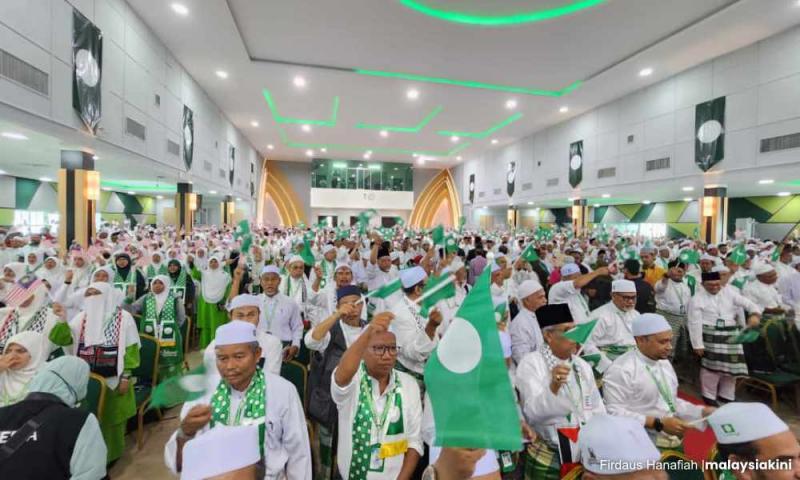

Bridget Welsh
Published: Sep 17, 2025 11:11 AM
Updated: 1:11 PM
COMMENT | The mood at PAS’ annual muktamar held this year at the Dewan Fadzil Noor, Kedah PAS Complex near Alor Setar was one of optimism.
There was a sense among the attendees that the time for the party to lead Malaysia is coming. From calls to decide the prime minister position to the high target of almost doubling parliament representation from 43 to 80 seats, PAS was showcasing the party’s dreams and ambitions – its great expectations.
PAS’ improved electoral fortunes, winning the lion’s share of Malay support, and increased wealth from control of four governments – Kelantan, Terengganu, Kedah and Perlis – is leading to changes in the party. The confidence was palpable, as was the display of position and power.
Yet in this rapid rise, there are inevitable tensions and contradictions. As in Charles Dickens’ novel about Pip Pirrip’s life story from humble beginnings, “Great Expectations”, the search for power and acceptance in a new status is hazardous.
PAS’ rise is an unfolding and unfinished story that rivals the intrigue and echoes some of the themes of the famous novel.
The muktamar showcased only some of the drama.
Rejecting and embracing benefactors
A clear message sent from the meeting was a rejection of the former prime minister 78-year-old Muhyiddin Yassin as the prime minister candidate – the party’s electoral benefactor in the previous general election, GE15.
While this may be understood as a preference for the younger opposition leader Hamzah Zainudin, it also speaks to ambitions within PAS to hold the nation’s top leadership position themselves.
Published: Sep 17, 2025 11:11 AM
Updated: 1:11 PM
COMMENT | The mood at PAS’ annual muktamar held this year at the Dewan Fadzil Noor, Kedah PAS Complex near Alor Setar was one of optimism.
There was a sense among the attendees that the time for the party to lead Malaysia is coming. From calls to decide the prime minister position to the high target of almost doubling parliament representation from 43 to 80 seats, PAS was showcasing the party’s dreams and ambitions – its great expectations.
PAS’ improved electoral fortunes, winning the lion’s share of Malay support, and increased wealth from control of four governments – Kelantan, Terengganu, Kedah and Perlis – is leading to changes in the party. The confidence was palpable, as was the display of position and power.
Yet in this rapid rise, there are inevitable tensions and contradictions. As in Charles Dickens’ novel about Pip Pirrip’s life story from humble beginnings, “Great Expectations”, the search for power and acceptance in a new status is hazardous.
PAS’ rise is an unfolding and unfinished story that rivals the intrigue and echoes some of the themes of the famous novel.
The muktamar showcased only some of the drama.
Rejecting and embracing benefactors
A clear message sent from the meeting was a rejection of the former prime minister 78-year-old Muhyiddin Yassin as the prime minister candidate – the party’s electoral benefactor in the previous general election, GE15.
While this may be understood as a preference for the younger opposition leader Hamzah Zainudin, it also speaks to ambitions within PAS to hold the nation’s top leadership position themselves.
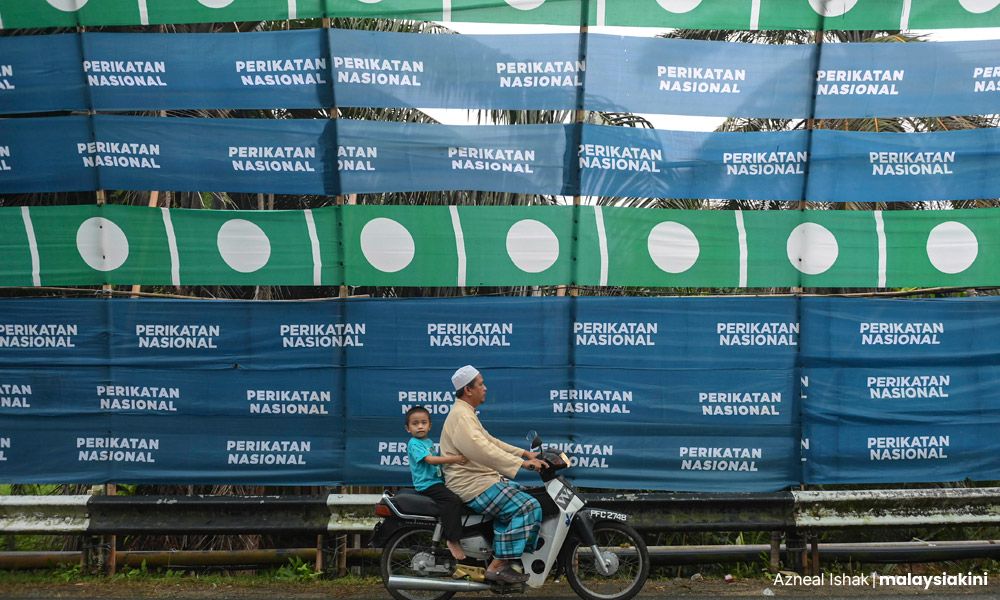
Increasingly, PAS members envision the party becoming the prime minister and openly propose alternatives during the meeting.
PAS no longer sees Bersatu as bringing the same value it did in the past, from resources to electoral support. The remaining question is whether Bersatu is a needed bridge to Malay voters who are hesitant to support the party, particularly in states such as Malacca, Johor and Negeri Sembilan, where Bersatu has its own base of support.
More and more within the party, this bridge is seen as no longer needed, with PAS making its own connections to the Malay base and strategically planning its own path towards GE16.
Many see Bersatu as unnecessary, arrogant in its leadership demands, and, for some, even expendable baggage. PAS’ dominance in the Perikatan Nasional partnership - and expectations in the dominant role - are openly manifesting.
At the same time, PAS continues to benefit from the main benefactor, Umno. More former Umno members have joined the ranks of PAS’ party leadership.
In the results announced yesterday for the PAS Central Working Committee, most of the winners are long-standing PAS members/leaders (as expected), but increasingly, leaders from Umno are coming into the party ranks.
The most obvious of these is scandal-ridden former Umno MP Shahidan Kassim from Perlis, yet before contesting and winning the Jitra assemblyperson position, former Universiti Utara Malaysia vice-chancellor and strategic planner Haim Hilman Abdullah – who won the third-highest votes - was also connected to Umno.
PAS as ‘new Umno’: A holding pattern
A major challenge for PAS is how it embraces leaders and the practices of Umno, as PAS now faces the view that the party is the “new Umno” – with all the negatives and positives this entails.
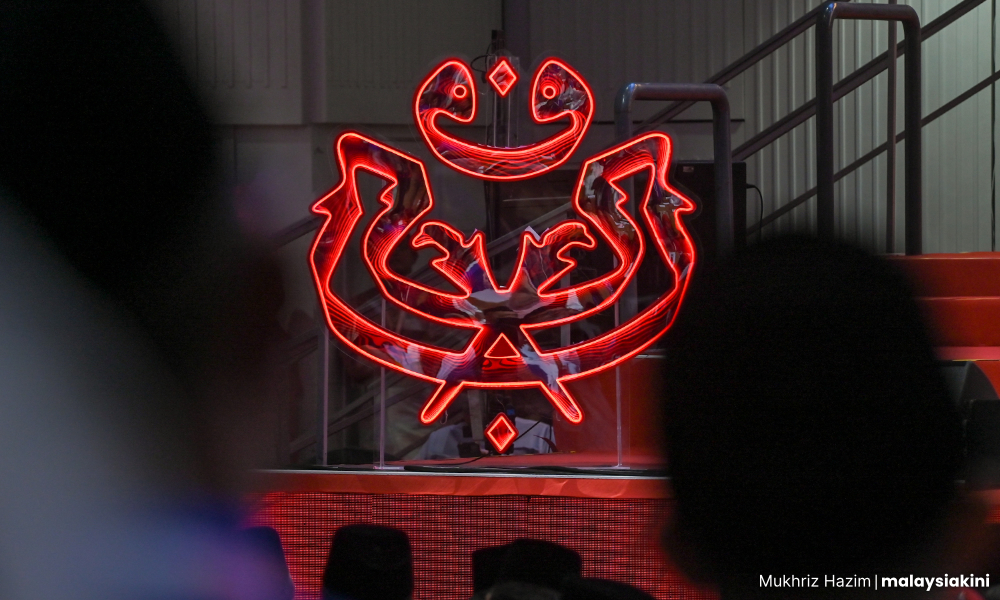
Quietly, among the rank and file, there are conflicted views about the costs of the party’s new status – with the nostalgic display of the party’s deceased (a decade ago) spiritual leader, Tuan Guru Nik Abdul Aziz Nik Mat, a reminder of the party’s more principled past.
Given the common history of the two parties, there are many parallels between PAS and Umno. One of these is how PAS is changing internally. As in the 1980s and 1990s, when Umno moved from a “grassroots” traditional party of teachers and unionists to modern businesspersons – PAS is also undergoing similar changes in membership composition.
The attire on sale in the stalls tied to the muktamar – predominantly modern sports jerseys with open appeals to the young – reflected a “new” modern look for the party – as did the luxurious cars in the VIP parking lot. Even the kopia on sale had a more modern style.
PAS’ challenge of being the “modern” party is hampered by its commitment to traditional ulama leadership and, even more of an obstacle, its intolerant outlook about society. PAS remains at its core deeply conservative, and the ability to accept difference is limited.
As PAS president Abdul Hadi Awang – who remained sitting in giving his speech due to his poor health – professed more embrace of non-Muslims and showcased the party’s lofty ambitions, his refrain of “Islam is the solution” reinforced the view that the party sees governance predominantly from a religious lens.
What was striking from the muktamar was the absence of meaningful policy solutions for the country’s problems. The disconnect between wanting government and showing it can govern was evident.
Even the records of the state governments in office were downplayed in the discussions, although in the displays in nearby halls, Kedah’s was arguably the most impressively presented.
Perhaps best illustrative of the challenges the party faces is the agreement to keep all of the top leadership in a “holding pattern,” to not disturb the ulama’s dominant leadership.
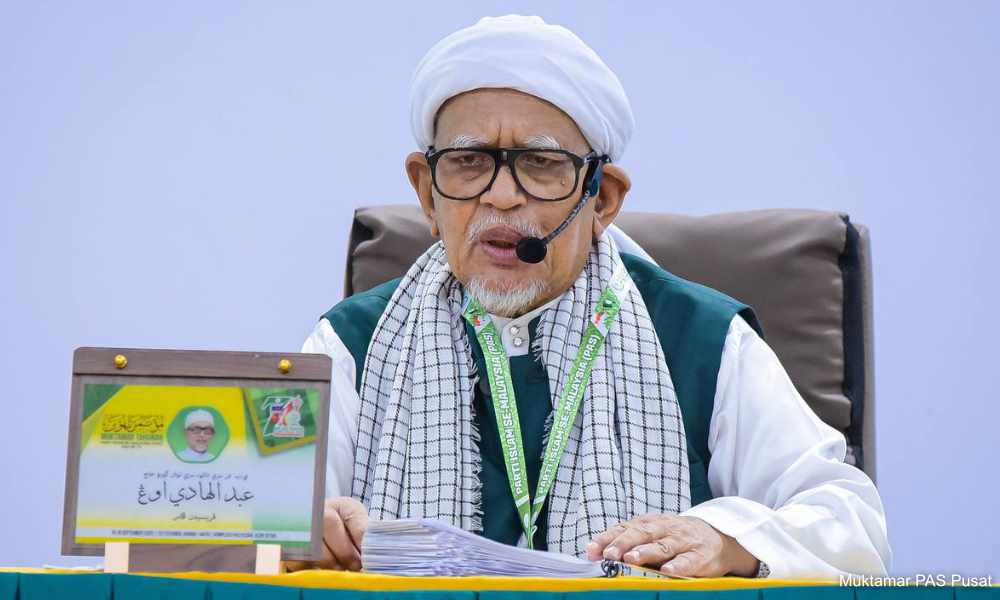
PAS president Abdul Hadi Awang
While Kedah Menteri Besar Sanusi Md Nor was to contest for the vice presidency, he withdrew. Some say this was because he received fewer nominations compared to the others and opted for a safer path.
The bigger picture is that the charismatic Sanusi candidacy for top leadership brings to the fore the thorny issue of how the party manages to include a range of different leaders whose support is drawn from different sources of legitimacy.
Searching for love
The anchor holding the party together at this time of transition is its president, Hadi. He controls the party and personifies it. Quietly, tensions continue to simmer internally as he holds onto power – as ironically Hadi is simultaneously holding the party’s ambitions back.
A theme of the 71st muktamar was outreach to non-Muslims – calls not to call them names (!!!), supposed equal party membership, talks with BN component parties and more.
Yet, as long as Hadi is leading the party, none of these are fundamentally believed. The damage of anti-Muslim hate speech in elections remains, and these themes continue to enter PAS narratives symbolically through anti-DAP rhetoric. How Gerakan is being treated by Penang PAS as secondary is telling.
Non-Muslim support has not substantively changed on the ground; these communities may be withdrawing support for the Madani government, but are opting to disengage – not vote - rather than change support loyalties towards PAS.
Non-Muslims largely continue to see PAS not as a political option. MIC and MCA, for example, seriously risk even further marginalisation if they ally with PAS.
Yet, PAS continues to believe it can win the national government, with the hope that non-Muslims, who have increasingly narrow political choices in Malaysia, will come on board.
While Kedah Menteri Besar Sanusi Md Nor was to contest for the vice presidency, he withdrew. Some say this was because he received fewer nominations compared to the others and opted for a safer path.
The bigger picture is that the charismatic Sanusi candidacy for top leadership brings to the fore the thorny issue of how the party manages to include a range of different leaders whose support is drawn from different sources of legitimacy.
Searching for love
The anchor holding the party together at this time of transition is its president, Hadi. He controls the party and personifies it. Quietly, tensions continue to simmer internally as he holds onto power – as ironically Hadi is simultaneously holding the party’s ambitions back.
A theme of the 71st muktamar was outreach to non-Muslims – calls not to call them names (!!!), supposed equal party membership, talks with BN component parties and more.
Yet, as long as Hadi is leading the party, none of these are fundamentally believed. The damage of anti-Muslim hate speech in elections remains, and these themes continue to enter PAS narratives symbolically through anti-DAP rhetoric. How Gerakan is being treated by Penang PAS as secondary is telling.
Non-Muslim support has not substantively changed on the ground; these communities may be withdrawing support for the Madani government, but are opting to disengage – not vote - rather than change support loyalties towards PAS.
Non-Muslims largely continue to see PAS not as a political option. MIC and MCA, for example, seriously risk even further marginalisation if they ally with PAS.
Yet, PAS continues to believe it can win the national government, with the hope that non-Muslims, who have increasingly narrow political choices in Malaysia, will come on board.
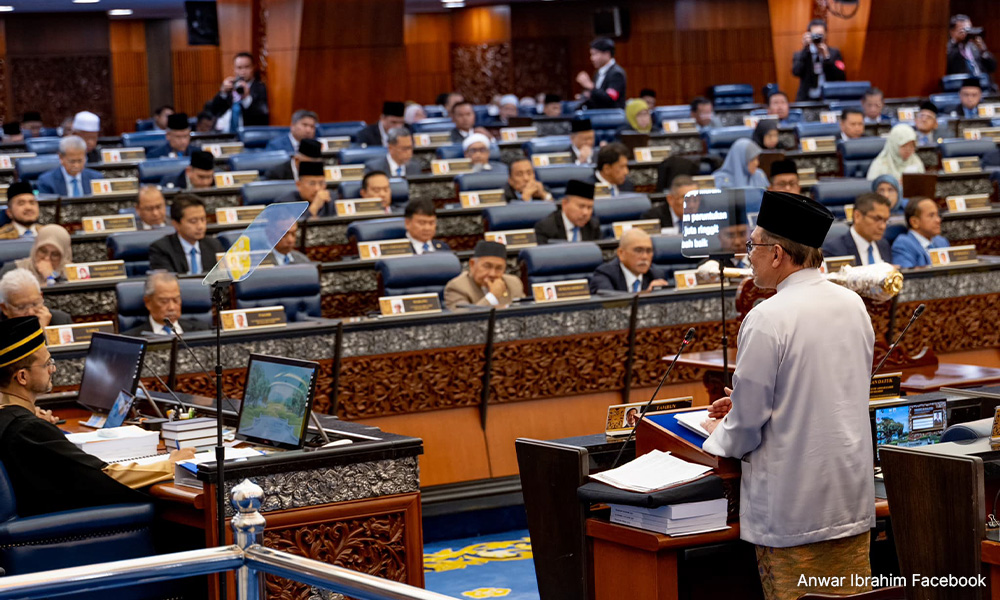
PAS believes its future lies with winning support from young Malays and aims to tap into the changing electorate. The target of 80 seats may seem large, but PAS is looking at the electoral numbers carefully.
Looking at voting patterns and projections of the composition of the electorate – detailed in future articles - 80 seats is not out of the imagination for the party. PAS holds the overwhelming majority of the Malay vote nationally, and it is only in a handful of states where alternatives Umno and Pakatan Harapan secure a sizeable share – Johor, Negeri Sembilan, Selangor and Malacca.
PAS is eyeing Perak, Pahang and Selangor for electoral gains – and trends do point to their favour at this juncture, especially in the first two states. PAS is aiming to become like Umno electorally, controlling the national dominant electoral position.
Similarly, PAS continues to tap into insecurity about the economy and capture the deep-rooted discontent among the Malay electorate. Global and demographic conditions favour PAS electorally.
Yet, it is important to appreciate that even small swings – as little as five percent - in support toward the Madani coalition can undercut PAS electoral ambitions in Peninsular Malaysia seats.
Malay politics in Malaysia remains highly competitive and fluid. While PAS outreach to youth – with revving up motorcycles and youthful sports wear a la Umno Youth of the past and more dynamic social media on TikTok – is ongoing, it is limited by the party’s provision of deliverables, and reservations about economic management.
Economic growth in PAS states is slowing – in line with national trends – and these states continue to depend on federal support. Malaysia’s multiethnic realities and the power of Borneo remain a major check for PAS.
For now, PAS winning 80 seats in Peninsular Malaysia – or more – while possible, will require more than what was on offer at the muktamar.
Meeting the unexpected
In the “Great Expectations” novel, there are surprises, disappointments and lessons; betrayals, unrequited love and hard realities assured that Pip’s life story did not follow the expected path.
PAS’ trajectory will likely face similar intrigue and drama. The party is wrestling with changing its identity and leadership as it seeks a greater national role and acceptance for that role – both inside and outside of PAS.
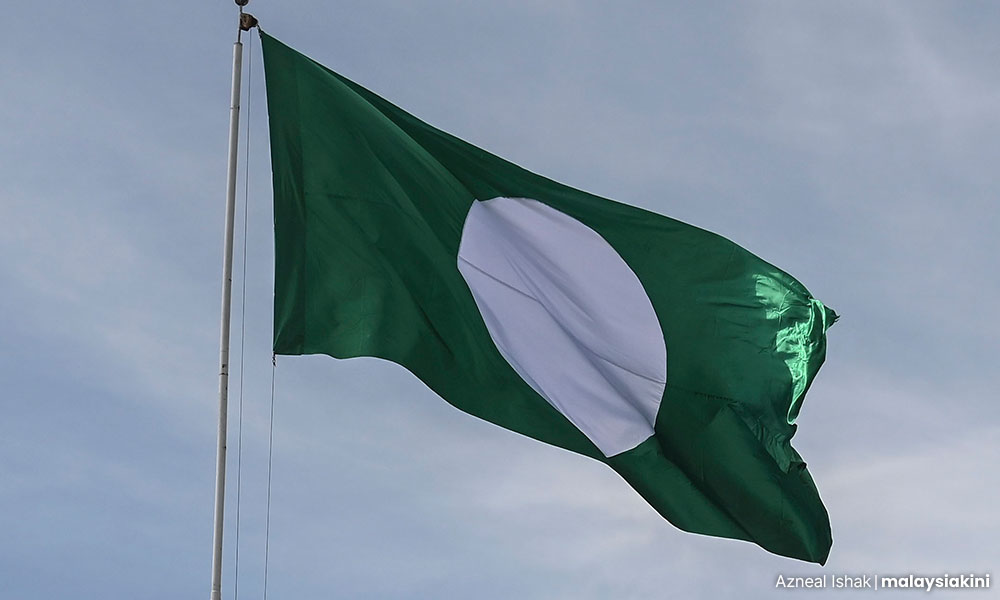
The party has more diverse views internally on how it should position itself ahead than is acknowledged, with resistance to change deep within the party’s DNA.
PAS continues to reconsider alliances internally – with Bersatu and other parties, including the Madani government. PAS has long been known for having multiple political partners and, as decided by party leaders, leaving them.
Importantly, the party struggles with what it stands for and for whom, as leaders’ self-interest for power (and resources) are influencing the party’s transformation.
For now, the view is that the party is on a linear path towards national power – with electoral gains expected but by no means guaranteed – should be tempered with the reality that the path ahead for PAS is steeper than it is appreciated and riddled with risks ahead.
PAS’ history has shown that its political future has not been linear.
The muktamar showed that PAS’ struggles are far from over – they are rather in a holding pattern – like PAS’ current top leadership.
PAS’ great expectations are the continuation of the party’s journey at a time of significant political change in Malaysia, with the end far from over.
BRIDGET WELSH is an honorary research associate of the University of Nottingham’s Asia Research Institute, a senior research associate at Hu Fu Centre for East Asia Democratic Studies, and a senior associate fellow at The Habibie Centre. Her writings can be found at bridgetwelsh.com

No comments:
Post a Comment